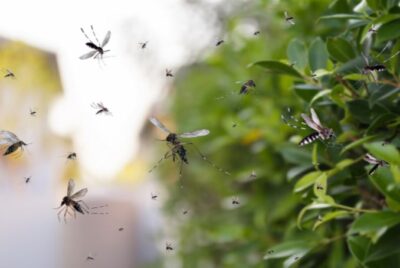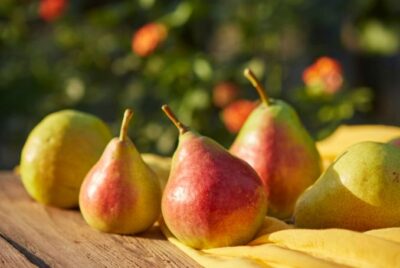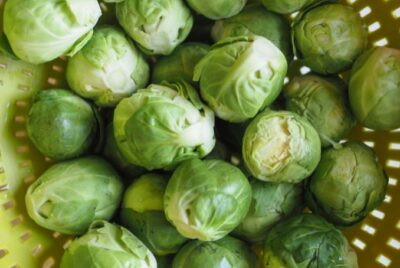Best Plants to Grow as Chicken Feed Alternatives
Rising costs, concerns over ingredient sources, and the pursuit of sustainable farming are pushing poultry keepers to reevaluate their feeding strategies. Many commercial feeds not only strain the pockets but also come with hidden additives, questionable grain sources, or environmental footprints that don’t align with eco-conscious goals.
Is it possible to find a solution that can both lower our chicken feed bill and ensure the well-being of our feathered friends? So in this article, we will discuss the best plant-based alternatives for chicken feed that promise a fresh, nutrient-rich, and sustainable approach to poultry nutrition.
Leafy Greens and Vegetables:

- Lettuce
Lettuce is a highly favored treat for chickens, primarily because of its hydrating qualities. With a high water content, feeding lettuce to your flock can be especially beneficial during warmer months to aid in hydration. Moreover, its fibrous nature serves as a digestion aid, ensuring smoother digestion processes within the chicken’s gut.
- Swiss Chard
A leafy green that’s both vibrant in color and packed with nutrients, Swiss Chard offers a two-fold benefit. It’s teeming with minerals such as calcium and magnesium, both of which are indispensable for chicken health, ensuring robust eggshells and optimal bone health.
Additionally, its richness in vitamins A, C, and K can significantly boost a chicken’s immunity, warding off potential illnesses.
- Kale
Often dubbed a superfood in human nutrition, Kale doesn’t disappoint in poultry diets either. It stands out with its rich array of vitamins, minerals, and antioxidants. These nutrients not only contribute to overall poultry health but also play a pivotal role in enhancing disease resistance.
The natural antioxidants in kale fortify the chicken’s immune system, possibly offering a protective shield against certain poultry diseases.
- Cabbage
More than just a nutritious feed, cabbage offers a unique feeding experience for chickens. When hung in the coop, chickens derive both entertainment and nutrition by pecking at it, promoting physical activity. Nutritionally speaking, cabbage can be a boon for digestive health, its fibrous content ensuring healthy gut function.
- Spinach
A familiar leafy green, spinach is as beneficial to chickens as it is to humans. It’s an excellent source of iron, which plays a critical role in hemoglobin formation, ensuring chickens have a healthy blood supply.
Furthermore, while moderation is key due to its oxalic acid content, spinach also provides calcium, instrumental in the formation of strong eggshells.
Squashes and Gourds:

- Pumpkins
Pumpkins are a delightful treat for chickens, especially during the fall season. Beyond their palatability, they’re packed with seeds that contain cucurbitacin, a compound known to act as a natural dewormer.
Thus, not only do chickens relish the fleshy part of the pumpkin, but the seeds can also help in keeping internal parasites at bay. Additionally, pumpkins are rich in essential vitamins and antioxidants that promote overall chicken health.
- Butternut Squash
Similar to pumpkins, butternut squashes are well-received by chickens. They offer a sweet taste, and both the flesh and the seeds serve as nutritious feed. Rich in beta-carotene, vitamins, and minerals, butternut squashes can aid in vision, growth, and immunity in chickens. The seeds, like pumpkin seeds, can also provide deworming properties.
Legumes:
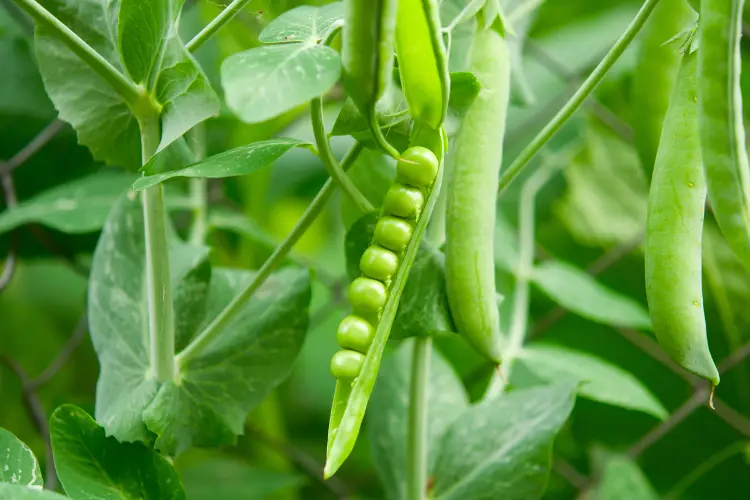
- Peas
Peas are more than just a garden treat; for chickens, they’re protein-packed morsels. As legumes, peas are a fantastic source of protein, vital for muscle growth, feather health, and consistent egg production. Furthermore, they contain a myriad of vitamins and minerals that can enhance a chicken’s overall well-being. Given either fresh or dried, peas are always a hit.
- Siberian Pea Shrub
An underrated yet highly beneficial plant for chickens, the Siberian Pea Shrub produces pea-like pods that chickens are fond of. These pods are rich in protein, similar to other legumes.
Additionally, the shrub itself offers shade and shelter, giving chickens a safe spot to rest and forage underneath aside from the chicken coop. Over time, as the shrub drops its pods, it provides a consistent and natural feed source for the flock.
Herbs:
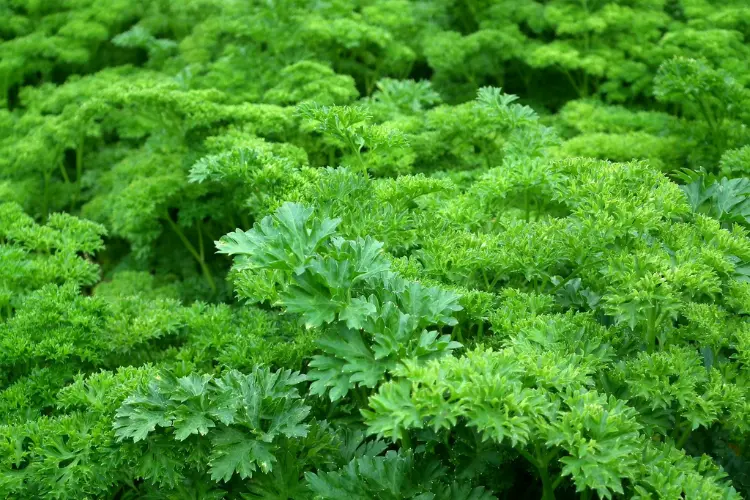
- Parsley
Parsley isn’t just a garnish; for chickens, it’s a nutrient-rich treat. It’s high in vitamins A, C, and K, which can enhance a chicken’s immune system. Additionally, parsley has been touted to boost reproductive health, potentially aiding in more regular egg laying and enhanced egg quality.
- Cilantro (Coriander)
Cilantro is more than a flavorful herb; it’s a powerhouse of antioxidants. These antioxidants can help fortify a chicken’s immune system, potentially reducing the risks of certain diseases. Moreover, cilantro may act as a detoxifier, helping purge metals and toxins from the body.
- Dill
Dill’s feathery leaves are a treat chickens will peck at with enthusiasm. Apart from its palatability, dill is known for its digestive benefits. It can promote a healthy gut, reducing issues like indigestion or gas, and ensuring your chickens are comfortable and healthy.
- Comfrey
Comfrey is often dubbed as “chicken salad” due to its popularity among poultry. High in protein and packed with essential vitamins and minerals, comfrey can support muscle growth, feather health, and consistent egg production. It also possesses anti-inflammatory properties that can aid in the healing of minor wounds or bruises.
- Yellow Mustard
While it’s essential to be cautious with mustard (some types can be too spicy for chickens), yellow mustard, especially its seeds, can act as a natural dewormer. Additionally, it’s believed to boost respiratory health, ensuring chickens breathe easier and are less prone to respiratory ailments.
- Alfalfa
Alfalfa sprouts or leaves are a favorite among many livestock, chickens included. Rich in protein and calcium, alfalfa can promote robust eggshell formation and enhance feather quality. Its dense nutritional profile ensures that chickens receive a balanced diet, boosting their overall well-being. Your chickens can eat these before the seed heads spread.
Fruits and Berries:
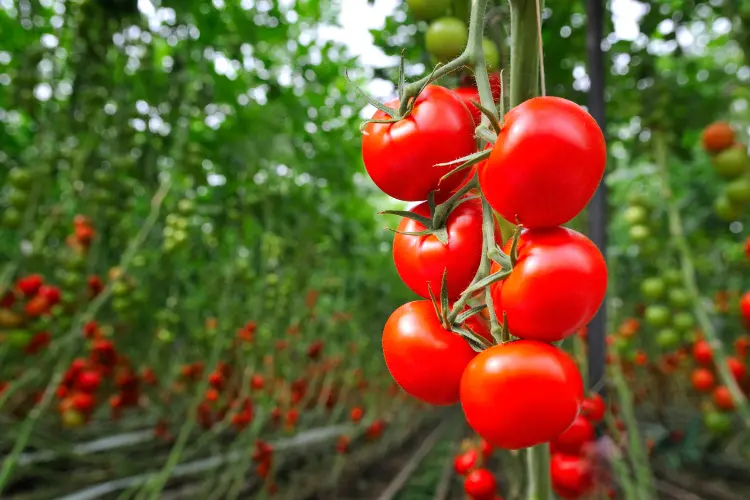
- Tomatoes
When ripe, tomatoes are both delicious and nutritious for chickens. They are rich in vitamins A and C, essential for boosting immunity and maintaining good vision. Furthermore, the lycopene in tomatoes acts as an antioxidant, promoting cell health and potentially warding off diseases. If you want to know more if chickens can eat any tomatoes, you can read it here.
- Blackberries
Chickens love pecking on these juicy treats. Blackberries are not just sweet; they’re packed with vitamins, minerals, and antioxidants. The antioxidants can protect cells from damage, ensuring healthier chickens. They also provide fiber, promoting good digestive health.
- Raspberries
Much like blackberries, raspberries are a hit among chickens. They offer a mix of vitamins, minerals, and antioxidants that promote overall health. Furthermore, the raspberry leaves, when dried, can be a beneficial addition to nest boxes, potentially aiding in smoother egg-laying.
- Strawberries
Chickens adore strawberries, and it’s not hard to see why. Beyond their sweetness, they’re laden with vitamins, minerals, and antioxidants. The high water content in strawberries also ensures hydration, especially beneficial during the warmer months.
- Blueberries
These small berries pack a punch. Can chickens eat blueberries? Yes, blueberries are renowned for their high antioxidant content, especially anthocyanins, which can fortify a chicken’s immune system and ensure overall vitality. They’re also a good source of vitamins C and K, further bolstering health benefits.
- Serviceberries (or Juneberries)
A lesser-known berry, serviceberries are nonetheless beneficial. They’re rich in vitamin C, dietary fiber, and manganese, promoting immune, digestive, and bone health, respectively. Chickens relish them, making them a great addition to their diet.
Trees and Shrubs (Providing Shade & Fruit):
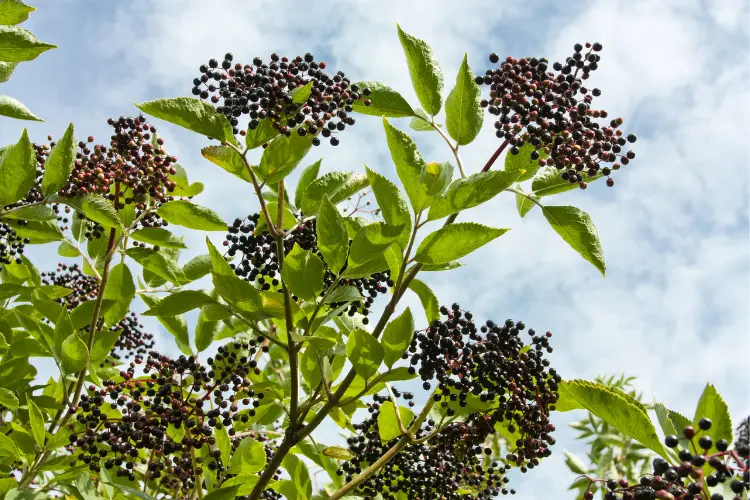
- Elderberry
Elderberries are more than just beneficial fruits; the elderberry plant itself offers protective cover for chickens in your chicken yard, shielding them from birds of prey and intense sun. The berries are nutrient-dense, providing a bounty of vitamins and antioxidants. Moreover, the shrub’s presence can enrich the environment, stimulating chickens with a natural setting to forage and explore.
- Fig Tree
The fig tree is a splendid addition to a chicken habitat. Its broad leaves ensure extensive shade, a haven for chickens during scorching summer days. The fruits, laden with nutrients, are a treat.
They’re high in fiber, ensuring good digestive health, and a plethora of minerals which ensure overall chicken vitality. Additionally, fallen fig leaves can be a fun and novel item for chickens to scratch and peck at, promoting natural behaviors.
- Mulberry Tree
The towering mulberry tree offers vast shade, making it an excellent choice for larger poultry areas. Its extensive canopy ensures chickens are shielded from the sun’s intensity and intermittent rain showers.
The berries are a double treat. Nutrient-rich, they drop regularly, providing chickens with a fresh, daily snack. This constant supply of berries ensures that chickens receive a regular dose of vitamins, minerals, and proteins unique to the fruit.
- Crabapple Tree
Crabapples are more than just ornamental. The tree’s dense foliage offers a sanctuary of shade, ensuring chickens remain cool during the warmer months. The fruits, though tart for human palates, are a delicacy for chickens. They provide vitamins, notably vitamin C, and antioxidants that promote overall health.
Moreover, crabapples can act as a natural dewormer, ensuring chickens remain free from certain internal parasites. As the fruits fall, they offer a consistent and engaging foraging opportunity for the flock.
Grains and Seeds:
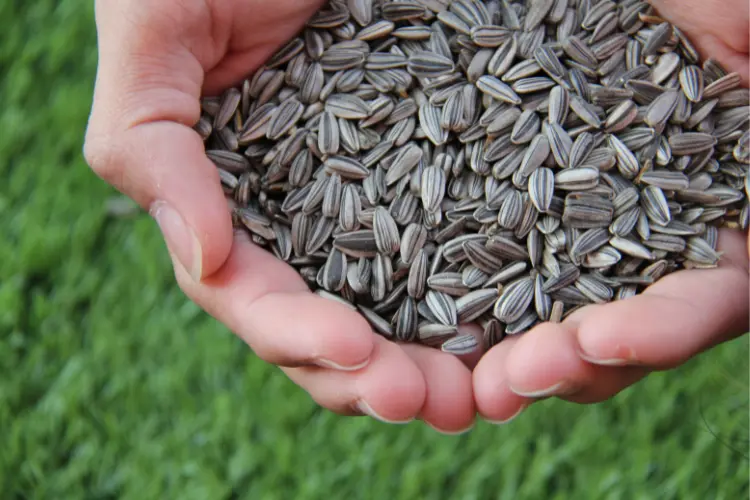
- Wheat
A staple in many chicken feeds, wheat provides essential energy through its carbohydrate content. Moreover, it’s a good source of essential amino acids and certain minerals, ensuring muscle growth and overall vitality. The fiber in wheat also supports digestive health, making it a balanced dietary component for chickens.
- Millet
Millet is a tiny but nutrient-packed grain. Rich in B vitamins, particularly niacin, riboflavin, and B6, it supports metabolism and energy production. Its protein content aids in feather and muscle development, making it especially useful during the molting season.
- Oats
Oats are more than just breakfast cereals; for chickens, they’re a source of balanced nutrition. They’re rich in fiber, promote good digestive health, and provide essential nutrients, including magnesium, iron, and zinc. The presence of antioxidants like avenanthramides can help reduce inflammation and promote heart health.
- Buckwheat
Though often mistaken as a grain, buckwheat is actually a seed, offering a plethora of benefits. It’s gluten-free, making it easily digestible. Rich in protein, amino acids, and several essential minerals, buckwheat ensures optimal health and growth in chickens. The plant itself, when grown, can act as a good ground cover, promoting insect activity for chickens to forage.
- Corn
Corn is often the primary energy source in many poultry diets. Its high carbohydrate content ensures chickens have the energy required for daily activities. It’s also a source of essential vitamins like folate and niacin, supporting metabolic processes.
- Amaranth (Grain & Greens)
Amaranth is an ancient grain, but its benefits are timeless. It’s protein-rich, ensuring strong muscle and feather health, and contains essential minerals like calcium and magnesium. The greens of the amaranth plant are also edible, providing chickens with a nutritious foraging option.
- Sunflowers (For seeds)
Sunflower seeds are a treat that chickens relish. High in healthy fats, they provide a quick energy source, especially during colder months. They also contain essential fatty acids, which promote heart health and shiny feathers. The added benefit of vitamin E ensures optimal cellular function.
Cover Crops & Weeds:
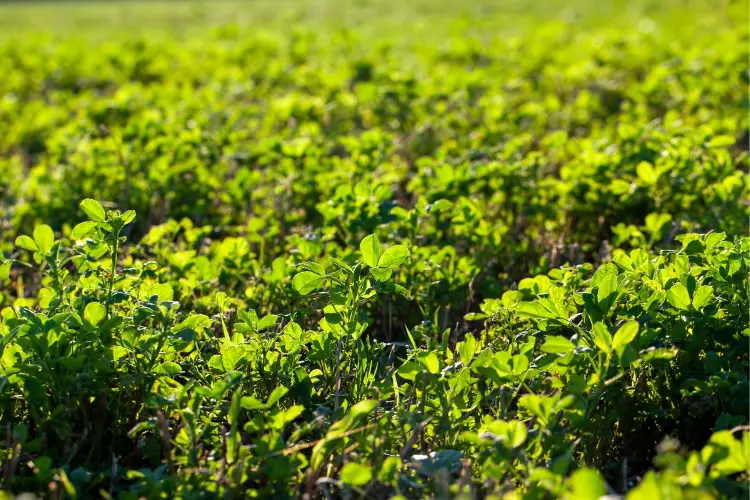
- Clover
Clover is a nitrogen-fixer, improving soil health, and a nutritious treat for chickens. It’s high in protein and contains essential minerals like calcium and phosphorus. The presence of clover in a chicken run promotes natural foraging behaviors, and its flowers are a particular treat for the flock.
- Stinging Nettle
While humans might shy away from the sting of nettle, chickens benefit immensely from this herb. It’s loaded with essential nutrients, including calcium, magnesium, and iron. When dried and added to their feed, it can boost egg production and overall vitality. Moreover, nettles have anti-inflammatory properties and can support a chicken’s immune and respiratory systems.
- Comfrey
Comfrey is both a soil builder and a medicinal herb. Its deep roots pull nutrients from the subsoil, benefiting other plants. For chickens, comfrey leaves are a protein-rich snack, aiding in muscle and feather development. Medicinally, comfrey can aid in the healing of minor wounds and bruises when applied as a poultice.
- Dandelion
Far from being a mere garden nuisance, dandelions are nutritional powerhouses for chickens. Their leaves are rich in vitamins A, C, and K, and they provide essential minerals like calcium and potassium.
Dandelion roots can act as a liver tonic, promoting overall internal health. The bright yellow flowers are a treat chickens eagerly peck at, and they contain antioxidants that support overall health.
- Burdock (Weed & Herb)
Burdock is another often-overlooked plant that has benefits for chickens. The leaves and seeds provide essential nutrients, while the roots, rich in inulin, promote digestive health. It’s also believed to have blood-cleansing properties, ensuring the overall well-being of the flock.
Conclusion
Growing your own chicken-friendly plants as free chicken feed isn’t just smart; it’s a game-changer. Instead of relying only on store-bought feeds, using easy-to-grow plants like greens, grains, and even berries can make chickens healthier and happier. They get to munch on a variety of natural foods, and we get the bonus of saving money and knowing exactly what our birds are eating.
Plus, watching backyard chickens forage in the chicken garden is a joy in itself. So, for anyone raising free-range chickens, it’s worth giving these plant alternatives a try. After all, happy chickens mean better eggs and a happier you!


